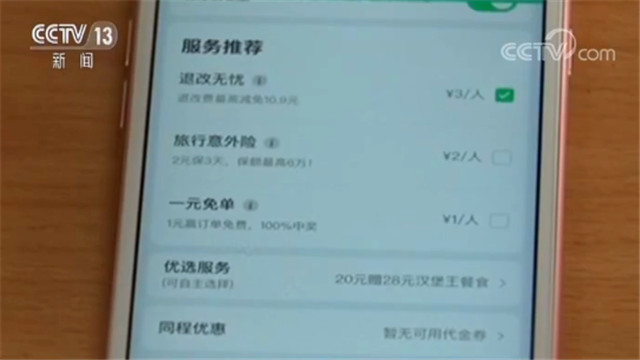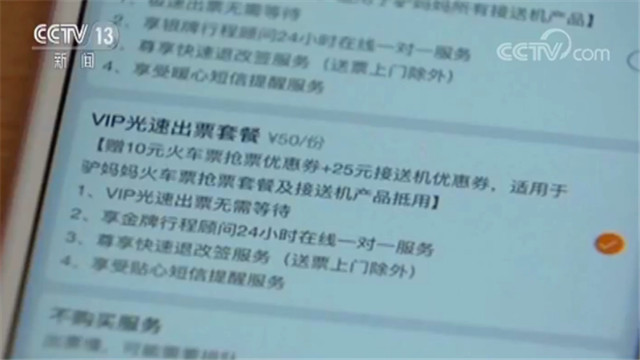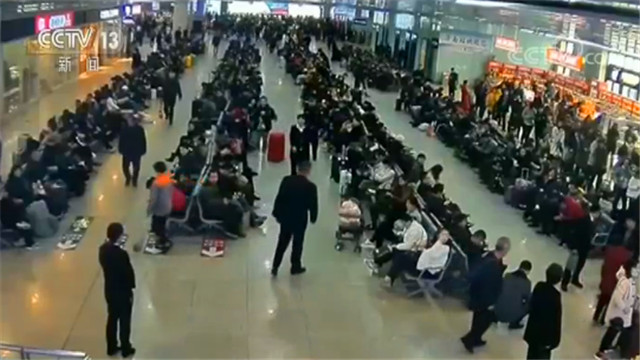It’s impossible to prevent! Have you encountered many "routines" for buying train tickets on third-party platforms?
CCTV News:Nowadays, fast services such as online ticket purchase and mobile payment are loved by more and more people, but there are hidden consumption traps behind the convenience. Recently, a large number of consumers broke the news that when buying train tickets on some third-party platforms, they always encounter the situation that train tickets are bundled and checked by default. According to the clues provided by consumers, the reporter had an experience on some commonly used third-party ticketing platforms.
The reporter opened the ticket purchase page of Tongcheng Yilong train ticket in WeChat applet and chose a second-class high-speed rail ticket between Beijing and Tianjin. The fare display was 54.5 yuan. But when the reporter submitted the order, the price automatically became 77.5 yuan. What about the extra 20 yuan? Most users may not know that they bought a preferred service at the same time. Only after clicking on the preferred service can they see the extra 20 yuan high-speed ticket. Moreover, this high-speed ticket is hidden deeply, and it is difficult to find it without careful search. The reporter manually cancelled the overcharged 20 yuan, only to find that the routine of bundling sales by merchants did not end. Just as the reporter was preparing to pay, the page showed that the total order amount was 66.5 yuan, and it was indicated in small red letters that 2 yuan had been offered. It turns out that the system has checked the special service of so-called high-quality users with the train ticket discount coupon *4 by default, so that the cost is higher than the actual fare of 54.5 yuan in 12 yuan. Once consumers find that they have overcharged when they enter the payment stage and want to cancel the additional service manually, the system will display that the trip is repeated and automatically jump to the original order. Can these unintentionally purchased products and services be cancelled? To this end, the reporter telephoned Tongcheng Yilong customer service.

Tongcheng yilong customer service: "yes, we can help you return it here. Please show me the mobile phone number you booked, and I will check it for you."
For some time, through consumer complaints and industry rectification, the after-sales service of some travel apps has been adjusted and improved accordingly. However, it is also the general mentality of many consumers to tolerate giving up the choice of overcharge because of the small amount and fear of complaints.

Consumer: "I think if it’s only a few tens of dollars, maybe we won’t handle it too much, unless the change is particularly great."
Then, do other third-party ticketing platforms also have the phenomenon of bundled sales? The reporter booked a second-class high-speed rail ticket from Shanghai Hongqiao to Beijing South Railway Station on Mama Donkey APP, and the ticket’s face price was 553 yuan. When the reporter clicked Submit Order, the total order amount was 623 yuan. In the process, the reporter did not check any additional items. After clicking on the details, the reporter found that there is a 50-yuan "VIP Lightspeed Ticket Package", which includes the exclusive fast return and change service, SMS reminder service, and the so-called gift coupons for 10 yuan train tickets and 25 yuan pick-up and drop-off. These extra "packages" are all checked by default. If the consumer doesn’t take the initiative to cancel, the extra fee will be paid together with the ticket money.

Subsequently, the reporter chose the second-class high-speed train ticket from Shanghai Hongqiao to Beijing South Railway Station on the Tuniu APP on the same day, and found that there was something fishy. After the fare of 553 yuan, the 30 yuan pick-up station coupon was added in small font.
Through a series of experiments, the reporter found that on online travel apps such as Tongcheng Yilong, Mama Donkey, Tuniu, etc., there are widespread phenomena of bundled consumption of train tickets and default check. When the order is finally paid, there will be more expenses such as quick ticketing, insurance service, hotel coupons and car rental vouchers for no reason. For these expenses, the platform has not made obvious consumption tips.
How do consumers deal with the "default tying" situation that is common in third-party ticketing platforms? The reporter randomly selected some Beijing citizens.

Consumer: "One is insurance, the other is a refund, and the other one seems to be the one who booked the ticket, so it can be expedited. If you are insured, you may be excusable. If you want that, you will speed up the booking. I feel quite deficient. You have as many tickets as you originally had, right? "
Consumer: "I met it when I ordered it from those softwares, but I usually take a look at it. You can check it." It is generally cancelled, but it may be accidentally paid when you are not paying attention. "
The paid service options of some ticketing platforms are deeply hidden, and consumers are easily "routined" and spend money inexplicably.
Consumer: "It should have a hint. Some people may say that if they don’t need it, they will just order it. If there is no hint, it will be inexplicable. Sometimes they may not find it for a long time."
Consumer: "We young people have extra tens of dollars for this, we can find it in time and cancel it, but for many middle-aged and elderly people, they may not find it, and then they will be cheated of these tens of dollars."
Consumer: "If it is really not checked, we will buy it, then maybe I will call customer service, talk to him about it, ask him to give me an explanation, or return the part we don’t need."
[Expert opinion] Default tying infringes on consumers’ rights and interests.
In this regard, legal experts made it clear that it is illegal for businesses to default to tying to infringe on consumers’ rights and interests. Many laws, such as the Anti-Monopoly Law, the Anti-Unfair Competition Law, the Consumer Rights Protection Law and the E-Commerce Law to be implemented next year, have clearly regulated the tying behavior of merchants.
Taking the Law on the Protection of Consumer Rights and Interests as an example, Article 8 stipulates that consumers have the right to know the real situation of the goods they buy or use or the services they receive; Article 9 stipulates that consumers have the right to choose their own goods or services. This also means that consumers have the right to choose to accept or refuse to buy any goods, and they should clearly know the products or services they want to buy when placing an order, rather than being misled by the merchants.
Jian Chen, director of the Legal and Theoretical Research Department of China Consumers Association, said: "Article 26 of the Consumer Law has special provisions on format clauses, which clearly inform consumers of some related information, such as the price of goods and services, and some important information related to consumers’ interests. Moreover, there is also a provision in it, which means that when you use the format clause, you can’t use technical means to hide and force the transaction at the same time. "
Zhu Wei, deputy director of the Communication Law Research Center of China University of Political Science and Law, said: "The E-commerce Law that has just been passed and will be implemented soon has clear provisions on the prohibition of tying. Tying does not mean that it is 100% impossible. The prerequisite is that consumers must be fully informed of the existence of tying behavior, and then consumers should be given a free choice on the basis of respecting their free choice and fair trade rights."
In fact, it is understandable to charge a certain fee for providing value-added services. As long as consumers agree, tying is sometimes a more convenient way to buy. However, experts said that if the merchants use the smoke screen method to muddle through and set the default consent option for consumption, so that consumers unconsciously spend money, it will infringe on consumers’ right to know and free choice, which is actually an extremely short-sighted marketing behavior.
During the interview, the reporter learned that many consumers have long been wary of the bundling and tying routines of online travel platforms.
Experts remind that if consumers choose a third-party platform to purchase tickets, they must pay more attention, check it many times, and don’t click on payment easily. If you buy unnecessary services and products, you can keep the corresponding evidence through screenshots and negotiate with the merchants. If negotiation fails, you can complain to the market supervision department or consumer rights protection organization, or you can directly bring a lawsuit in court.
In order to protect the legitimate rights and interests of the vast number of passengers, the website of China Railway Customer Service Center 12306 made an announcement on its official website as early as 2015, reminding passengers to directly log on to the website of 12306 or the mobile client of 12306 to purchase tickets, and not to purchase tickets through third-party purchasing websites and mobile clients, so as to avoid the inability to refund or change tickets online because the purchasing party fraudulently uses other people’s information, which will affect travel; Remind passengers not to provide personal information to third-party websites and mobile phone clients to avoid risks caused by personal information disclosure.